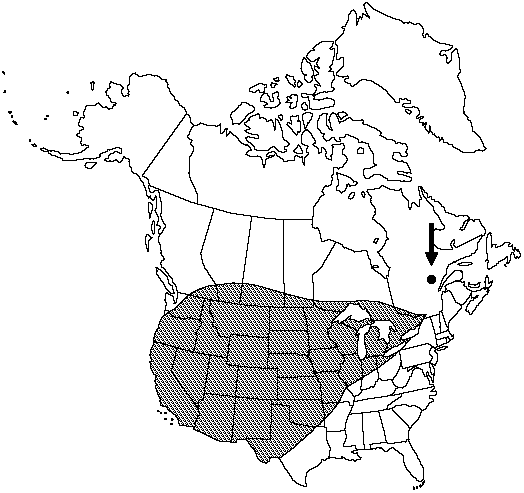Difference between revisions of "Equisetum laevigatum"
Amer. J. Sci. Arts 46: 87. 1844.
FNA>Volume Importer |
FNA>Volume Importer |
||
| Line 20: | Line 20: | ||
}}<!-- | }}<!-- | ||
| − | --><span class="statement" id="st- | + | --><span class="statement" id="st-undefined" data-properties=""><b>Aerial </b>stems lasting less than a year, occasionally overwintering in the southwestern United States, usually unbranched, 20–150 cm; lines of stomates single; ridges 10–32. <b>Sheaths</b> green, elongate, 7–15 × 3–9 mm; teeth 10–32, articulate and usually shed early, leaving dark rim on sheath. <b>Cone</b> apex rounded to apiculate with blunt tip; spores green, spheric. <b>2n</b> =216.</span><!-- |
-->{{Treatment/Body | -->{{Treatment/Body | ||
| + | |phenology=Cones maturing in spring–early summer. | ||
|habitat=Moist prairies, riverbanks, roadsides | |habitat=Moist prairies, riverbanks, roadsides | ||
|elevation=1530–3500 m | |elevation=1530–3500 m | ||
| Line 42: | Line 43: | ||
|basionyms=Equisetum funstonii | |basionyms=Equisetum funstonii | ||
|family=Equisetaceae | |family=Equisetaceae | ||
| + | |phenology=Cones maturing in spring–early summer. | ||
|habitat=Moist prairies, riverbanks, roadsides | |habitat=Moist prairies, riverbanks, roadsides | ||
|elevation=1530–3500 m | |elevation=1530–3500 m | ||
| Line 49: | Line 51: | ||
|publication year=1844 | |publication year=1844 | ||
|special status= | |special status= | ||
| − | |source xml=https://jpend@bitbucket.org/aafc-mbb/fna- | + | |source xml=https://jpend@bitbucket.org/aafc-mbb/fna-data-curation.git/src/9216fc802291cd3df363fd52122300479582ede7/coarse_grained_fna_xml/V2/V2_20.xml |
|genus=Equisetum | |genus=Equisetum | ||
|subgenus=Equisetum subg. Equisetum | |subgenus=Equisetum subg. Equisetum | ||
|species=Equisetum laevigatum | |species=Equisetum laevigatum | ||
| − | |||
| − | |||
| − | |||
| − | |||
| − | |||
| − | |||
| − | |||
| − | |||
| − | |||
| − | |||
| − | |||
| − | |||
| − | |||
| − | |||
| − | |||
| − | |||
| − | |||
| − | |||
}}<!-- | }}<!-- | ||
-->[[Category:Treatment]][[Category:Equisetum subg. Equisetum]] | -->[[Category:Treatment]][[Category:Equisetum subg. Equisetum]] | ||
Revision as of 13:13, 27 July 2019
Aerial stems lasting less than a year, occasionally overwintering in the southwestern United States, usually unbranched, 20–150 cm; lines of stomates single; ridges 10–32. Sheaths green, elongate, 7–15 × 3–9 mm; teeth 10–32, articulate and usually shed early, leaving dark rim on sheath. Cone apex rounded to apiculate with blunt tip; spores green, spheric. 2n =216.
Phenology: Cones maturing in spring–early summer.
Habitat: Moist prairies, riverbanks, roadsides
Elevation: 1530–3500 m
Distribution

Alta., B.C., Man., Ont., Que., Sask., Ariz., Ark., Calif., Colo., Idaho, Ill., Ind., Iowa, Kans., Mich., Minn., Mo., Mont., Nebr., Nev., N.Mex., N.Dak., Ohio, Okla., Oreg., S.Dak., Tex., Utah, Wash., Wis., Wyo., n Mexico including Baja California.
Discussion
Schaffner named this species Equisetum kansanum because he applied the name E. laevigatum to what we now know is the hybrid E. × ferrissii. The coarser-stemmed, occasionally persistent forms in the southwestern United States have been called Equisetum funstonii.
Selected References
None.